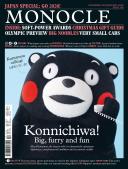
Issue 129
With the world’s attention set to be fixated on the Far East during Olympic year, we’re celebrating all things Japan. Cover star Kumamon – the big, furry and fun mascot of Kumamoto prefecture – fires the starting gun but there’s plenty more, from J-pop’s freshest faces to devotees of the Suzuki Jimny. Elsewhere we lavish praise of Japan’s unique approach to craftsmanship and clothes-making, find out why the country’s communist party endures and go in search of the best – and biggest – Sanuki udon noodles. Plus: a Christmas gift guide and our inaugural Soft Power Awards.
In This Issue
Oops! No content was found.
Looks like we no longer have content for the page you're on. Perhaps try a search?
Return Home

